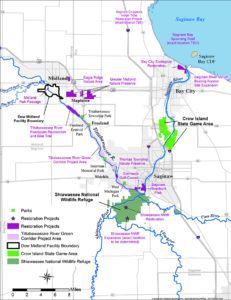Funding Available for Natural Resource Restoration in the Saginaw Bay Watershed
This blog is designed to highlight some of the key information provided in a Michigan DNR press release regarding restoration funding and projects in the Saginaw Bay watershed from November 4, 2021. To read the entire press release and learn more about the funding available for restoration efforts in the Saginaw Bay watershed, please click HERE . The press release was issued jointly by The Natural Resource Trustees for the Tittabawassee River and the Saginaw River and Bay to inform the public of settlement funding available for restoration efforts within the watershed.

Known restoration projects to date in the Saginaw Bay watershed. Map created by and sourced from the U.S. Fish and Wildlife Service.
How much funding is available?
There is approximately $5.7 million available to fund restoration projects in the Saginaw Bay watershed. These funds will also be used for projects that were outlined in the settlements with Dow Chemical and General Motors.
Who is providing the funding?
The funding has been made available through a 2020 settlement with The Dow Chemical Company and a 1998 settlement with General Motors and others for natural resource damages within the Saginaw Bay watershed. These funds will be issued through the two Trustee Councils mentioned above.
What is the funding for?
The funds are to go toward the completion of restoration projects within the Saginaw Bay watershed, including projects that would focus on the Tittabawassee River and the Saginaw River.
What kind of restoration projects will be selected?
Restoration projects being submitted for consideration for funding should benefit natural resources that were injured due to the release of harmful chemicals such as dioxins, furans, or polychlorinated biphenyls by Dow Chemical or General Motors. Restoration projects that improve public access and enjoyment of natural resources in the area may also be considered, so long as the projects also focus on helping or improving the injured natural resources. More information about criteria for restoration projects within and along Saginaw Bay, the Tittabawassee River, and the Saginaw River can be found at links available in the press release (click HERE to be redirected to the press release).
When is the deadline to submit restoration project pre-proposals?
December 31, 2021, is the deadline for the submission of restoration project pre-proposals. No submissions will be accepted after this date.
The post Funding Available for Natural Resource Restoration in the Saginaw Bay Watershed appeared first on Michigan United Conservation Clubs.
Recent Posts



